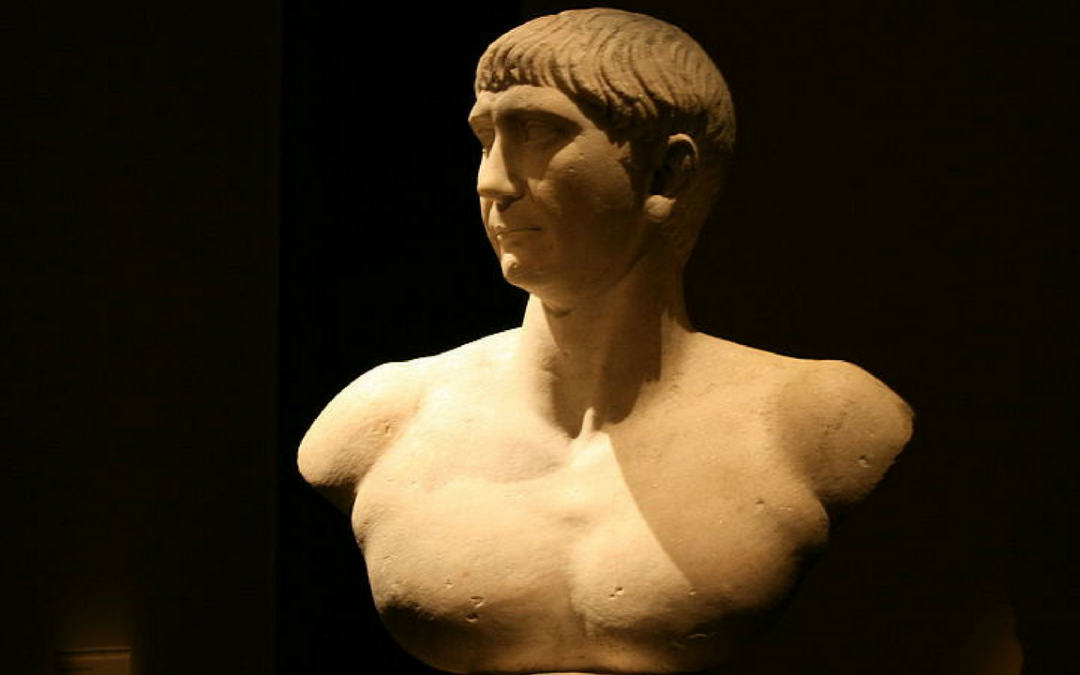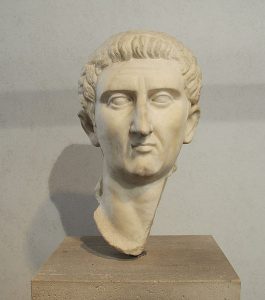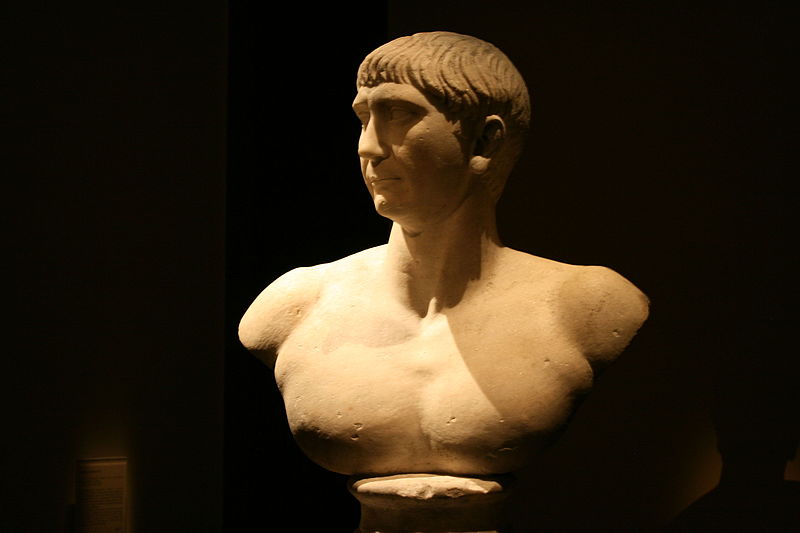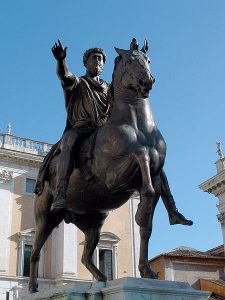Nerva, Trajan, Hadrian, Antoninus, and Aurelius were dubbed The Five Good Emperors because of the long period of prosperity Rome had under their consecutive rule. Rome territory expanded significantly during this period, and it’s borders reached as far as they ever would. Each emperor ruled in their own way, but they all improved some aspect of the Empire, and kept it’s border’s safe from invaders. Peasants and other citizens became richer, and better educated thanks to their welfare, and influence. It lasted from 96 AD to 180 AD.
Nerva
Nerva was the first of the Five Good Emperors, and started a reign that would allow Rome to see great prosperity. Nerva didn’t choose to be emperor and instead was chosen by the Senate. He only ruled for two years but in that time he managed to write the wrongs of the previous ruler, which included lowering oppressive tax rates, allowed people who had been exiled to return, and acted more justly towards Christians. He also began helping the poor. Nerva funded public education for the children of poor parents. One of his greatest deeds was in picking his successor. He knew he wouldn’t live much longer, and didn’t have a male heir. He decided to adopt a general named Trajan to succeed him. Trajan was well respected, as well as wise and just. It’s because of these reasons that Nerva is remembered as one of the Five Good Emperors. Nerva died in 98 AD only one year after adopting Trajan in 97 AD, and two years after becoming Emperor in 97 AD. Before Nerva Rome was ruled by the emperor Domitian, who was seen as a tyrant, and was eventually killed by conspirators.
Trajan
Trajan extended the Roman empire to the East, and brought the Roman empire to it’s territorial peak. Trajan was a brilliant general with a passion for warfare. Trajan was close to Domitian and enjoyed benefits from this. When Domitian died, he was quickly adopted by Nerva, and soon afterwards became emperor. Trajan was an expert at crafting his image, this apparent due to his actions after Nerva’s death. Before entering Rome he first visits the legions along the Rhine and Danube fronts. Even though Nerva died in 98 AD he waits until 99 AD to ever enter the capital. When he first enters Rome, he hugs all of the senators, and even walks on foot with the citizenry, which was unprecedented. Trajan was beloved by his people for investing improving roads, constructing aqueducts, and many other projects designed to help the public. He fought and won two wars against the powerful Dacian kingdom. He didn’t stop there, Trajan went on to conquer the Armenians, and managed to take over all of Mesopotamia.
Hadrian
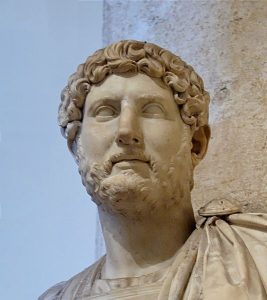
Hadrian is the third of the Five Good Emperors. Hadrian grew in Spain and moved to Spain when to fourteen. He began working under Nerva as Tribune, and went on to work under Trajan after Nerva’s death. Hadrian succeeded Trajan after he died, even though Trajan never actually named a successor. Plotina, Trajan’s wife, named him as successor in his stead, as she and Trajan were both fond of him. Hadrian travelled across the entire Empire, inspecting things personally to make sure that everything was running efficiently. He saw more of the Empire than any other emperor. Hadrian spent so much time inspecting the army that he would even eat and sleep with ordinary soldiers, something rarely done. His reign got off to a bad start when four respected senators were killed for plotting against Hadrian. Hadrian most likely murdered these men, but he put the blame of the Senate and a man named Attianus. After this he proved himself to be a competent ruler and the Empire saw relative peace under his rule. Hadrian made sure to expand public welfare, and tightened border defences. Hadrian made sure to learn all of the problems of the different provinces of the empire, and tried to solve as many as he could. He learned that British Roman citizens needed protection from barbarians from the North, and so built Hadrian’s Wall to protect them. Hadrian was a controversial, and feared ruler, but still one of the Five Good Emperors of Rome.
Antoninus Pius
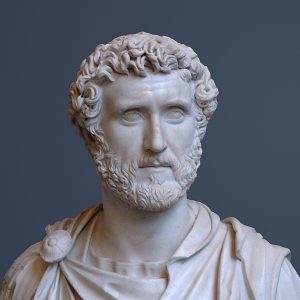
Rome was peaceful under Antoninus but war wasn’t a long way off. Antoninus Pius was the adopted son of Hadrian. His rule was noticeably different from Hadrian’s, he took a less hands on approach to governance. He was conservative with finance, and didn’t spend money on pointless luxuries. When necessary he would even dip into his own funds in order to pay for food or water if there was a shortage. He spent money finishing the projects of the previous emperors, as they had promised many buildings but hadn’t finished them all. He repaired broken roads, and bridges including the restoration of the oldest bridge in Rome. Antoninus did a lot to honour Hadrian’s memory, he built a shield for him, established a priesthood, and had the senate deify him. Because of his devotion to Hadrian, he gained the honorific Pius at the end of him name.
Marcus Aurelius
Marcus Aurelius was the last of the Five Good Emperors, interestingly he was actually a co-emperor with his adoptive brother Lucius Verus. On paper they had equal power, but Marcus seemd to be the one in charge. They didn’t live in easy times, the brothers were invaded by the Parthians, and some of the returning soldiers from the war brought back a plague that wiped out a portion of the Empire’s population. People believed the plague appeared because the gods were angry which led to Christians being persecuted. The Roman-Parthian war lasted from 161 to 166 AD, when the Parthians invaded Syria. Aurelius was more interested in intellectual pursuits than conquering and left it mainly to Verus, who stayed in Antioch. Verus fought against the Parthians for five years before he finally won. After their conflict with the Parthians they had a short period of peace before they were invaded by Germanic tribes in the 160s. Verus died during this war. In the year 175 AD a general named Avidius Cassius attempted to take power and declared himself emperor. Marcus got ready to take power back but before he could, Cassius was assassinated. After this Marcus attempted to drive back the Germanic tribes once more, and this time he had his son Commodus as Co-emperor to help him in the conflict.

